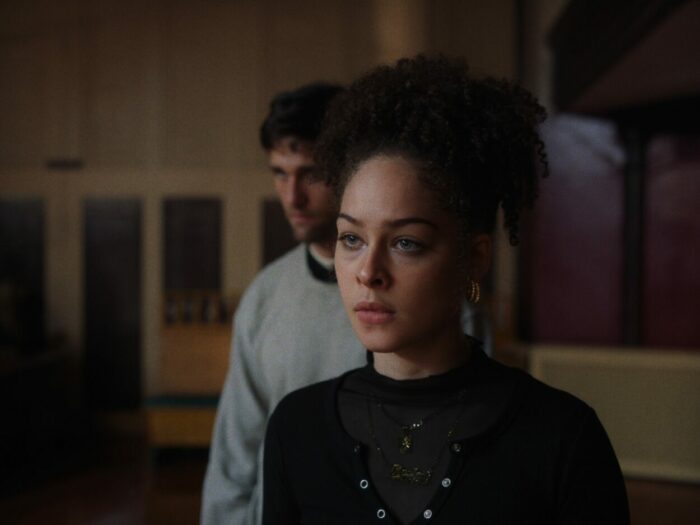It’s 2020 and Regina (Liz Caribel Sierra) is attending yet another meeting for recovering addicts in New York City. With her in the room, and also members of this particular group themselves, are Dev (Ben Groh) and Luca (Dion Costelloe)—the latter of whom is an aspiring actor. Both of whom are infatuated with her—listening to her “share” the same thing she’s always shared for the past several group sessions, both in-person and virtual—the profanity-laden parable of how her abusive ex-boyfriend, Russel (Jared Abrahamson), evicted her from their apartment and kept their dog, Parranda, for himself. Each and every time, she ends with the phrase “I pray that he’ll die in God’s time,” in lieu of directly wishing or inflicting death on him herself. But today is different. Today, Regina carries with her a heavy, solemn, and determined air; a determination that leaks into how she ends her story not with “God’s time,” but with a flatly stated “so, I’m going to kill him.”
Hearing this, Dev freaks out—and much like he has in the opening moments of the film, he freaks out directly to us. In the first few minutes of Daniel Antebi’s God’s Time—an endearingly ambitious firecracker of a feature debut— Dev has introduced himself, the people around him, and Regina’s situation through breaking the fourth wall with his whippersnapper wit, complemented by a maelstrom of various cinematic techniques conveying the breakneck pace of his stream of consciousness. One of the first things Dev says to us is that he’s “not the hero of this story,” but it’s clear by how he gets his own theme song and fabricates a narrative about helping a direly injured man on the street (in reality, he just smoked with him) that he clearly places himself at a not-insignificant level of importance. Now, with Regina’s confession, and her possibly homicidal intentions, Dev takes it upon himself to truly become the hero he yearns to be, dragging a callback-seeking Luca along on a tour through New York City to stop Regina from annihilating her entire future in a single gunshot.

God’s Time is a distinctly rare breed of an indie debut—one whose rapid-fire deployment of formal and aesthetic tricks doesn’t distract from the story being told, but is relatively telegraphed, thought-out, and well-performed. Even in its most overbearing moments still fairly complement the film’s overarching narrative. This is very much a film that’s attempting to bottle up and capture a specific breed of frenetic urban essence, which will almost definitely earn itself comparisons to the Safdie Brothers‘ films (Heaven Knows What being the first of theirs that comes to mind), internet-era satires such as Zola, as well as late-1990s-to-early-2000s indies such as Trainspotting, but its main distinction is that its production very much seems to be a labor of earnest, eager love from everyone involved. It exchanges the grunginess of its precursors for a comedy that’s at once willing to hinge its humor on morbidity while also carrying with it an earnest emotional heart.
Narratively speaking, God’s Time is the type of film that initially seems to hinge on the apparent zaniness of its individual encounters, as Dev and Luca search for Regina in almost every place they think she can be within the city. Whether it be the hilarity that ensues as they try to infiltrate her place of employment, another group of addicts she’s taken on a leadership position in, and so on, each of these individual encounters in the first half or so introduce and build off of various gags and developments as nothing Dev and Luca do goes they way they originally intend. The stress of that constant element of surprise isn’t just something that we watch them experience. We also feel it ourselves, with equally chaotic-yet-coherent editing that leapfrogs between a variety of points of time, different film speeds, and even different visual mediums, while a drum-led, jazzy soundtrack blares beneath it all, something that certain audiences are bound to find overbearing at points.

This sort of slapstick comedy-of-errors style of storytelling, as Antebi knows, can only sustain itself for so long. That is especially the case when God’s Time hinges on Dev’s lack of self-consciousness about his egoism and how it affects those around him—an egoism reinforced by how he places so much importance on his interactions with the audience and how the film itself seems to construct itself around his constantly jumpy, imaginative state of mind. As the film steadily begins shifting focus to Regina and her perspective, God’s Time works in tandem to chart a uniquely emotional path through narrative depictions of addiction recovery, one that at once treats the actions of its characters with the weight they deserve, while also paving the way for a message with a sincere sense of heart piercing its way through. The film’s fourth-wall breaks become more confrontational about our perspective on the situation, the threat of violence only becomes more imposing, and lifelong bonds are tested as the consequences of Dev and Luca’s trail of chaos begin to catch up to them.
For all of the flamboyant cinematic magic tricks that God’s Time lobs at the audience—far too overzealously at points, which might be a major point of contention for certain viewers who find such aesthetic decisions dated—none of it would mean anything if the film didn’t have actors at its center who seem destined for pure greatness in their futures. Ben Groh is deeply entertaining and charming as Dev, a character who would collapse under the weight of his self-aggrandizement without the sheer charisma of someone like Groh to also give him a peppy, endearing persona. Serving as Groh’s foil is Dion Costelloe as Luca, a character devoted enough to Dev to follow him around on his chaotic exploits, but has his own mind to speak about what those exploits actually entail once he starts losing his patience. As for Regina, Liz Caribel Sierra delivers an absolutely luminary performance, rightly recognized for it at last year’s Tribeca Festival with a Special Jury Mention. Her righteous anger, protective personality, and internal conflict are so naturalistic to watch on screen, by merit of the fact that Sierra seems to be tossing every ounce of herself into the role in order to completely sell every part of Regina’s worldview.
What makes God’s Time such a charming film to watch, even amidst its deliberately constructed stylistic turmoil, is that you won’t need the blooper reel it places in the credits to know that absolutely everyone here seems to have had a great time making it, even on such a tight schedule. Antebi makes clear in a Filmmaker Magazine interview published during its Tribeca premiere last June that the making of God’s Time was very much a hurried labor of love, one that started production on incredibly short notice, but spontaneously came together with the help of good fortune and good people who embodied what Antebi wanted to achieve. The effort very much shows. Even if the film’s specifically dated wit and formal madness can become profoundly overbearing to some, it’s readily apparent in every frame that it all comes from an earnest place. By the time the film reaches its surprisingly emotional conclusion, it becomes clear pretty quickly that this is an endearingly cohesive and soulful final product about what it really means to do the right thing in the mess of our lives, and who exactly the right thing is being done for.




